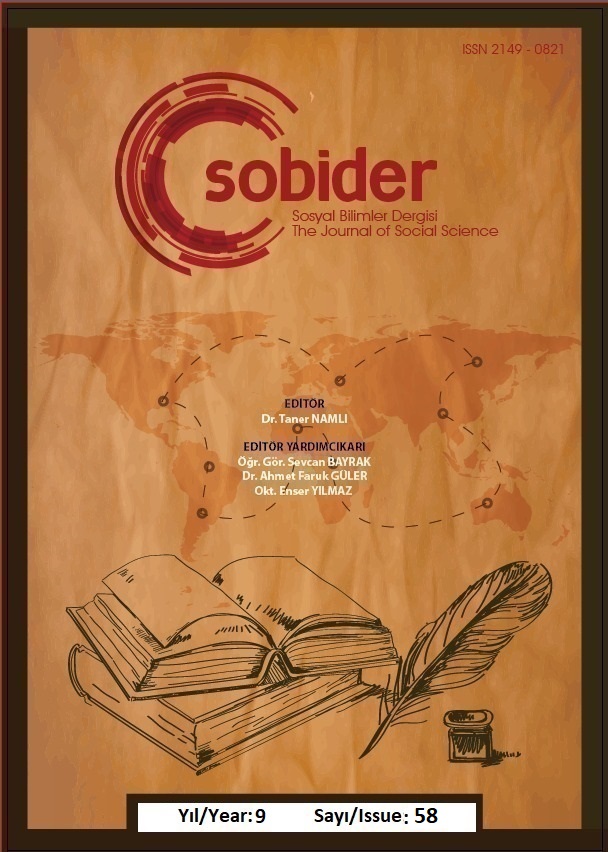Author :
Abstract
Araştırmada öncelikle post-truth kavramına Türkçe bir karşılık önerilmektedir. Öte yandan “hakikat- gerçeklik- doğruluk” kavramlarının çoğu zaman birbirinin yerine kullanılması da söz konusudur. Dolayısıyla bu kavramların sınırlılıklarını belirleyip net açıklamalar gerekmektedir. Bu kavramların ayrımını yapmak, aynı zamanda post-truth kavramına Türkçe karşılık önerirken de yardımcı olacaktır. Bu tanımlama ve Türkçe çeviri çalışması, önceden var olan yalan haberlerin post-truth dönem koşullarında ne şekilde ortaya çıktığının anlaşılmasını sağlayacaktır.
Yeni teknolojilerin gelişmesiyle internet ve sosyal medyanın bireylerin hayatlarının merkezi olmuştur. Sosyal medya ortamındaki kullanıcı türevli içeriklerin yaygınlaşması nedeniyle yalan haberler dolaşıma girmektedir. Çünkü bireyler, bir içerik üretirken veya önceden üretilmiş bir içeriği paylaşırken bilginin doğruluğuna bakmadan paylaşmaktadır. Bu durum, içinde bulunduğumuz post-truth dönemin de etkisiyle önemli bir problem olarak ortaya çıkmaktadır.
Yalan haberleri saptamada doğrulama platformlarının katkısı oldukça önemlidir. Birçok ülkede bu tarz uygulamaların yapıldığı görülmektedir. Bu araştırmada, Fransa'da France 24 kanalının "The Observers" organizasyonunu ve Türkiye'de "Teyit.org" platformu incelenecektir. Her iki platformun ortak yönlerine bakarken aynı zamanda birbirinden ayrılan özelliklere de odaklanarak doğrulama platformlarının çalışma yöntemleri aktarılacaktır. Araştırmanın neticesinde doğrulama platformlarının şeffaflık ilkesine bağlı kalması, platformlara olan güveni arttıracağı sonucuna ulaşılmıştır.
Keywords
Abstract
In the research, first, a Turkish translation for the concept of post-truth is suggested. On the other hand, the concepts of "truth-reality-truth" are often used interchangeably. Therefore, the limitations of these concepts should be determined, and clear explanations are required. Distinguishing these concepts will also help when suggesting a Turkish translation for the concept of post-truth. This definition and Turkish translation study will provide an understanding of how pre-existing fake news emerged in the post-truth period conditions.
With the development of new technologies, the internet and social media have become the center of individuals' lives. Fake news is circulating due to the widespread use of user-derived content in the social media environment. Because individuals share the information while producing a content or sharing a previously produced content without considering the accuracy of the information. This situation emerges as an important problem with the effect of the post-truth period we are in.
The contribution of verification platforms in detecting fake news is very important. It is seen that such applications are made in many countries. In this research, "The Observers" organization of France 24 channel and "Teyit.org" platform in Turkey will be examined. While looking at the common aspects of both platforms, the working methods of the verification platforms will be conveyed, focusing on the features that distinguish them from each other. As a result of the research, it has been concluded that the fact that the verification platforms adhere to the principle of transparency will increase the trust in the platforms.
Keywords
- Allcott, H. ve Gentzkow, M. (2017). Social Media and Fake News in the 2016 Election, Journal of Economic Perspectives, Spring, 31(2), 211–236. Erişim adresi: https://www.researchgate.net/publication/316712634_Social_Media_and_Fake_News_i n_the_2016_Election.
- Alpay Y., (2017), Yalanın Siyaseti, İstanbul: Destek Yayınları.
- Dönmezçelik, Ö. (2019). Epistemolojik Bir Tartışma: Twitter’da Doğruluk-Ötesi Konulu Çalışmalar. Içinde H. Hülür & C. Yaşın (Ed.), Bilgi, Doğruluk veTwitter (ss. 85-113). Ankara: Ütopya Yayınları.
- Gilchrist, A. (2018). Post-truth: an outline review of the issues and what is being done to combat it. Ibersid. 12:2 13-24.
- Graves, L. (2016). Deciding what’s true: The rise of political fact-checking in American journalism. Columbia: University Press.
- Gray J. (2017). Post Truth by Matthew D’Ancona and Post-Truth by Evan Davis review-is this really a new era of politics? The Guardian, https://www.theguardian.com/books/2017/may/19/post-truth-matthew-dancona-evandavis-reiews
- Keyes R. (2019). Hakikat Sonrası Çağ: Günümüz Dünyasında Yalancılık ve Aldatma. Ankara: Delidolu Yayınları.
- Köktürk M. (2020). Post-Truth ya da Mağaraya Dönüş, Sosyal Bilimler Dergisi, Pasajlar, Post- Truth Çağı, Doğubatı Yayınları, Yıl: 2, Sayı:4, Ocak, s.35-55.
- McIntyre, L. (2019). Hakikat-Sonrası. İstanbul: Tellekt Yayınları.
- Oruç, M. S. (2020). Postmodernite, Siyasal İletişim ve Doğruluk Sorunu: Post-Truth Durum ve Entelektüel Zemini Üzerine Bir İnceleme, Türkiye İletişim Araştırmaları Dergisi, Sayı:36, s. 141-160.
- Rabin-Havt, A. (2016). Lies, Incorporated: The World of Post-Truth Politics. New York: Anchor Books.
- Tandoc E.C.Jr., Lim Z.W., Ling R. (2018). Defining “Fake News”. Digital Journalism, 6:2, 137-153. Erişim adresi:https://www.researchgate.net/publication/319383049_Defining_Fake_News_A_t ypology_of_scholarly_definitions.
- Terzi A. (2020). Post-Truth Kavramı ve Türkçe Karşılıkları Üzerine. Türk Dili Dergisi, Nisan, Sayı: 820, s: 80-86.
- Teyit.org, (2019). Sözlük: Yanlış bilginin en yaygın yedi türü, https://teyit.org/sozluk-yanlis- bilginin-en-yaygin-7-turu Erişim Tarihi: 5 Haziran 2021.
- Teyit.org. (2022). Factory. Erişim Adresi: https://teyit.org/factory.
- The Observers. (2022). Who Are We? Erişim Adresi: https://observers.france24.com/en/who- are-we.
- Ünver, H. A. (2020). Türkiye’de Doğruluk Kontrolü ve Doğrulama Kuruluşları. İstanbul: EDAM.
- Wardle C. ve Derakhshan H. (2017). Information Disorder Toward an Interdisciplinary Framework for Research and Policymaking. Council of Europe, September 27, 2017.





